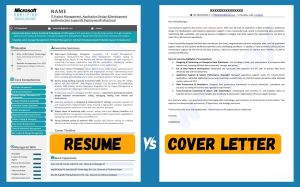
Resume and cover letter differences. A cover letter is a customized, paragraph-based letter that highlights your qualifications for a particular position, whereas a resume is a factual, bullet-pointed description of your education, experience, and skills. While the resume concentrates on your accomplishments and credentials, the cover letter tells your professional biography and explains why you are applying by providing context, showcasing your personality, and emphasizing soft skills.
RESUME AND COVER LETTER DIFFERENCES
In the realm of job applications, two documents play crucial roles in presenting a candidate’s qualifications and suitability for a position: the resume and the cover letter. While both serve the purpose of showcasing a candidate’s professional profile, they each have distinct formats, purposes, and functions. Understanding the differences between the two is essential for crafting effective job application materials. Let’s delve into the nuances that set apart resumes and cover letters:
Meaning of Resumes;

RESUME AND COVER LETTER DIFFERENCES
A resume is a concise summary of your professional experience, skills, education, and accomplishments. It serves as a snapshot of your career journey and provides recruiters with a quick overview of your qualifications.
Key features of a resume include;
1. Structured Format
Resumes typically follow a structured format, organized into sections such as Contact Information, Professional Summary or Objective, Work Experience, Education, Skills, and Awards or Certifications.
2. Bullet Points
Information on a resume is presented using bullet points, making it easy for recruiters to scan and identify relevant details quickly.
3. Quantifiable Achievements
Resumes highlight quantifiable achievements, such as revenue generated, projects completed, or targets achieved, to demonstrate your impact in previous roles.
4. Customization
Resumes should be tailored to each job application, focusing on relevant skills and experiences that align with the requirements of the position.
Meaning of cover letters;

RESUME AND COVER LETTER DIFFERENCES
A cover letter is a personalized document that accompanies your resume when applying for a job. It provides an opportunity to introduce yourself to the hiring manager, express your interest in the position, and elaborate on why you are the ideal candidate. Key features of a cover letter include:
1. Personalized Address
Cover letters are addressed to the hiring manager or recruiter by name, if possible, adding a personal touch to your application.
2. Introduction and Body
The cover letter begins with an introduction. Where you mention the position you are applying for and how you learned about it. The body of the cover letter elaborates on your qualifications. Highlighting specific experiences and skills that make you a strong candidate.
3. Connection to the Job
Cover letters explain why you are interested in the position and the company, emphasizing how your skills and experiences align with the job requirements and company culture.
4. Closing Statement: Cover letters conclude with a polite closing statement, expressing gratitude for the opportunity to apply and reiterating your interest in the position.
Key Differences:

1. Purpose
The primary purpose of a resume is to provide a comprehensive overview of your qualifications and professional history, while a cover letter serves to introduce yourself, express your interest in the position, and make a compelling case for why you are the best candidate.
2. Format
Resumes follow a structured format with bullet points, whereas cover letters are more narrative in nature, allowing for a more personalized introduction.
3. Content
Resumes focus on factual information such as work experience, education, and skills, while cover letters provide an opportunity to showcase your personality, passion for the role, and fit for the company culture.
Summary
While resumes and cover letters are both essential components of a job application. They serve distinct purposes and should complement each other effectively. Crafting a well-written resume and cover letter tailored to each job application. It can significantly enhance your chances of standing out to potential employers and securing interviews. By understanding the differences between the two documents and leveraging their respective strengths. You can present a compelling case for why you are the perfect candidate for the job.